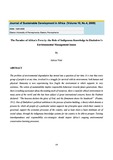Please use this identifier to cite or link to this item:
https://cris.library.msu.ac.zw//handle/11408/1400Full metadata record
| DC Field | Value | Language |
|---|---|---|
| dc.contributor.author | Viriri, Advice | - |
| dc.date.accessioned | 2016-05-19T08:15:46Z | - |
| dc.date.available | 2016-05-19T08:15:46Z | - |
| dc.date.issued | 2006 | - |
| dc.identifier.issn | 1520-5509 | - |
| dc.identifier.uri | www.jsd-africa.com/Jsda/V10N4_Spring2009/PDF/ParadoxAfrica%20Poverty.pdf | - |
| dc.identifier.uri | http://hdl.handle.net/11408/1400 | - |
| dc.description.abstract | The problem of environmental degradation has turned into a question of our time. It is true that every group of people is at any time, involved in a struggle for survival with its environment, both human and physical. Humanity is now experiencing how fragile the environment is which supports its very existence. The notion of sustainability implies responsible behaviour towards future generations. Since there is nothing sacrosanct about the existing stock of resources, there is need for ethical environment in many parts of the world and this has been subject of great international concern, hence the Psalmist declared: “The heavens declare the glory of God, and the firmament shows his handwork” (Psalms, 19:1). One of Zimbabwe’s political ambitions is the process of nation building, a theory which denotes a process by which all people of a particular nation supports the principles upon which their country is governed, support the economic processes of the country, and at least share a basic minimum set of social values, through the indigenous knowledge systems for the country to be able to prosper. Existing interdependence and responsibility eco-strategies should inspire Africa’s ongoing environmental conservation learning processes. | en_US |
| dc.language.iso | en | en_US |
| dc.publisher | Clarion University of Pennsyslavia | en_US |
| dc.relation.ispartofseries | Journal of Sustainable Development in Africa;Vol. 10, No.4; p. 129-146 | - |
| dc.subject | Poverty, Indigenous Knowledge, Zimbabwe | en_US |
| dc.subject | Environmental Management Issues | en_US |
| dc.title | The paradox of Africa’s poverty: the role of indigenous knowledge in Zimbabwe’s environmental management issues | en_US |
| dc.type | Article | en_US |
| item.languageiso639-1 | en | - |
| item.openairecristype | http://purl.org/coar/resource_type/c_18cf | - |
| item.grantfulltext | open | - |
| item.fulltext | With Fulltext | - |
| item.openairetype | Article | - |
| item.cerifentitytype | Publications | - |
| Appears in Collections: | Research Papers | |
Files in This Item:
| File | Description | Size | Format | |
|---|---|---|---|---|
| ParadoxAfrica Poverty.pdf | Abstract | 346.18 kB | Adobe PDF |  View/Open |
Items in MSUIR are protected by copyright, with all rights reserved, unless otherwise indicated.



